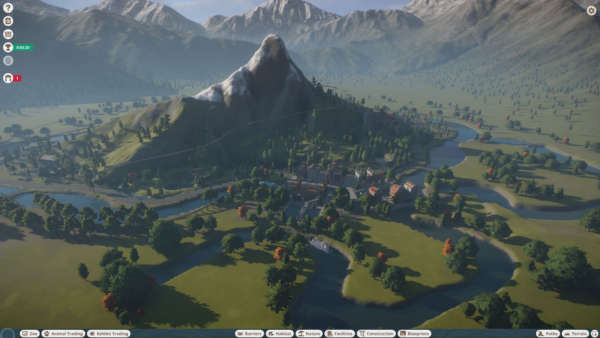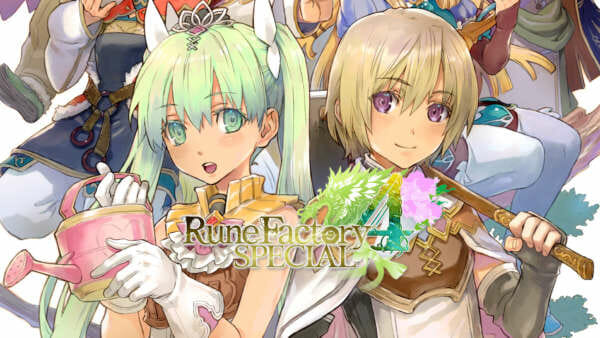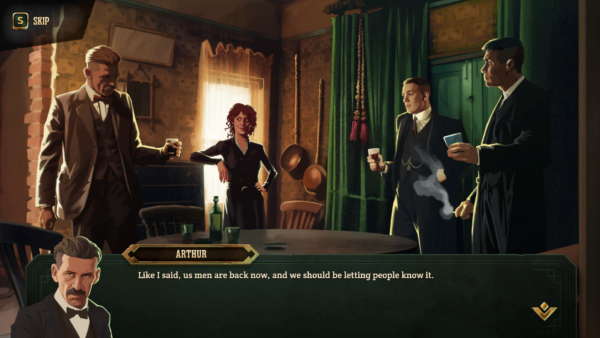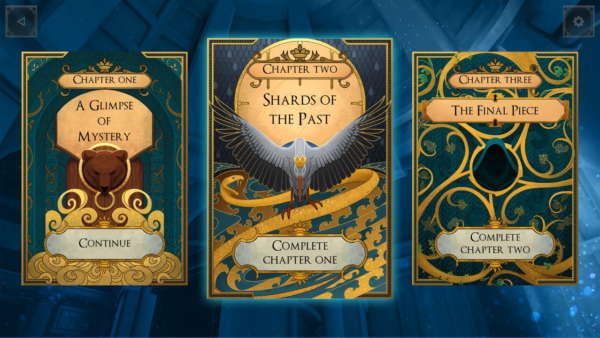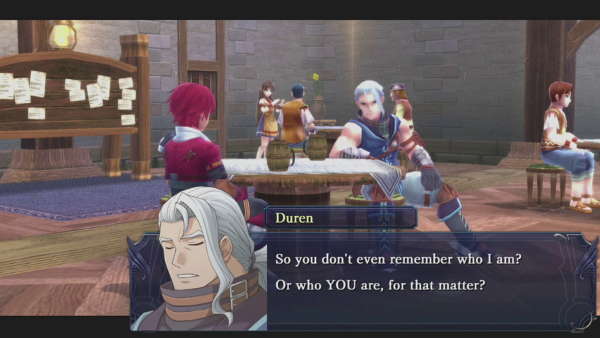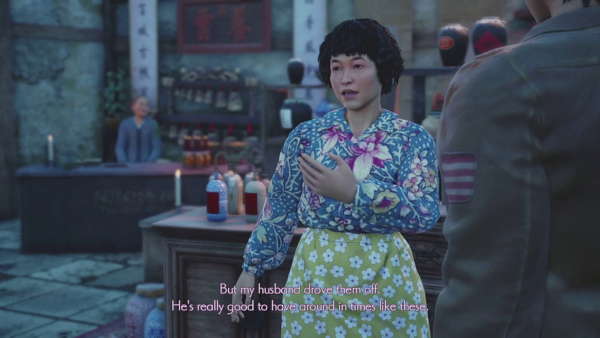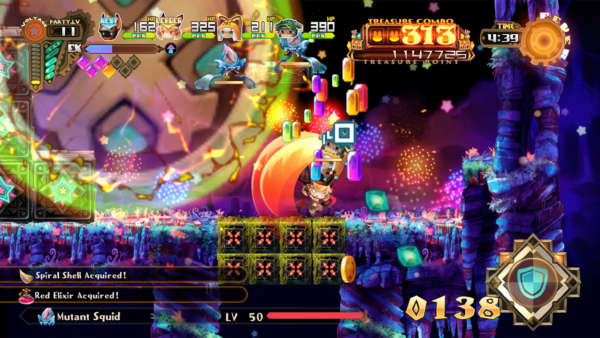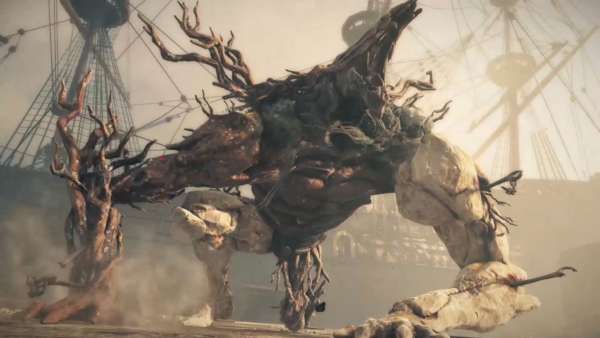| Civilization V: Brave New World |
| Players: 1 – 8 |
| Genre: Turn-Based Strategy |
| Platform: Windows |
| Developer: Firaxis Games |
After Gods and Kings release last year Civilization V hit its stride. Although the initial release of Civilization V was seen as a downgrade by some fans, Firaxis have been toiling away to make it the definitive entry in the series. The second expansion, Brave New World, both improves upon the solid foundations built over the last three years and expands on mechanics that were previously lacking. With culture being reworked and the introduction of the world congress, does this expansion step forward into the future or give us what should have been there long in the beginning?
What is immediately apparent is that Brave New World feels like the lost third of the game. While it comes with a slew of other updates, the core focus is on changing the way culture effects the world. Choosing to take the more peaceful route is no longer a case of steam-rolling a single resource. The old game of waiting to fill out social policy trees is out, replaced with a more dynamic system that forces you to be much more diplomatic.
Culture points are still featured, used to buy bonuses and outline your civilisation, but the new inclusion of tourism has you take a more pro-active role. Gaining a culture victory is now obtained primarily though this new social currency. If your overall tourism output outstrips every other leaders total culture production you win, becoming the epicentre of the civilised word. Tourism acts as your weapon against other civilisations while culture gives you an edge.
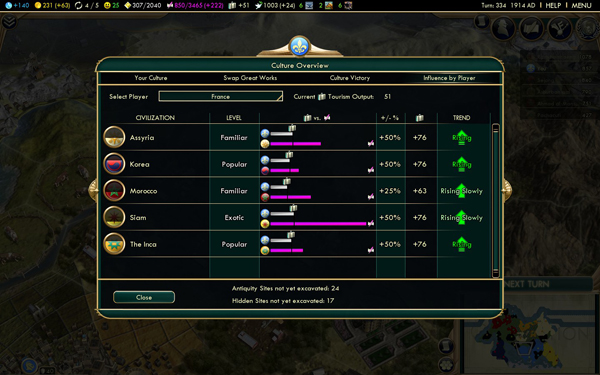
This Is The Cultural Equivalent Of Seeing Your Soldiers Sack An Army
Like Gods and Kings’ introduction of faith points, the new statistic is harder to earn than money and science. Creating a steady, high amount of Tourism proves to be a challenge compared to the relatively easy task of accruing culture. The process of making tourism begins with great people. Taking a larger role than before, artists, writers and composers create great works to entice the worlds populace to your civilisation. Sacrificing these units to create a great work doesn’t mean anything without a place to house them though. Opera halls, museums and wonders house these items to create tourism. Additional bonuses are given for adhering to certain themes such as time period and being culture specific.
This develops throughout the game, with early generation of tourism coming from works made by great people. Mid-game it expands as you develop relationships with other cultures to gain percentage bonuses over them to boost your influence. Mid-to-late game archaeologists units appear to gain additional museum pieces, claimed from sites of battles in ages long past. It is also a great chance steal artefacts from other lands to complete a bonus set. That is until they forbid you to continue with the threat of war.
Trade-routes now play a major role in filling your coffers. Land and sea units travel on grand expeditions to other cities to gain additional gold, infect their lands with a foreign religion or go to one of your own cities to give them a quick production boost. While starting off small, the number and range of these units increase as you climb up the tech tree. It is a much more fluid and interesting way of money-making and has a number of interesting repercussions, especially to the party who instigates the trade as they receive the lion’s share of the benefits. These easy targets will be raided for their cargo by barbarians and enemy leaders, so careful planning is required to make the most out of the system.
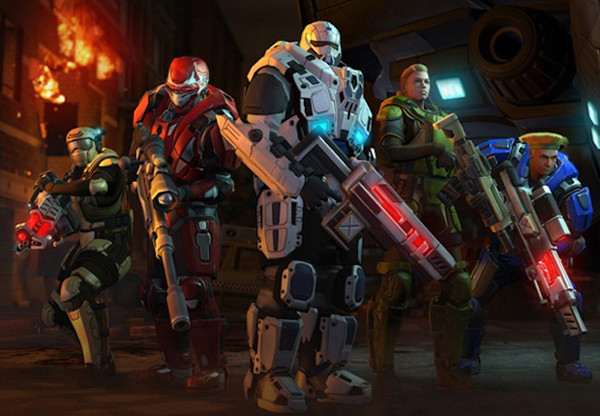
Guess Who Turn Up As Late Game Units
The final large alteration to the formula is the world congress; a council that oversees the world once a civilisation has met every other culture and researched specific technologies. Convening every 30 turns to introduce and vote on resolutions, the congress can have a huge impact on the world’s politics if use correctly. The more delegates you control, the more influence you hold over the congress, and perhaps become the head of the congress. This is where the real fun starts. Having an issue a new religion encroaching on your pious citizenship? Make yours the world’s official belief. Does an enemy rely on one specific resource? Ban it and leave it worthless. If you really want to go extreme you can force a world ideology, possibly crippling another leader’s victory plan. Wars can be won and lost before even entering the battlefield and this gives more diplomatic players an extra weapon to fight more aggressive players. The World Congress changes the late game for the better, giving a greater focus on diplomatic relations and bargaining for additional votes and power.
One of the main problems of Brave New World is the same focus on diplomacy that it also benefits from. Even though the new mechanics make you interact more with other leaders, which gives the impression of being part of a larger world, it shines a light on the games questionable AI. While vastly improved over the years from its original state, the occasional issue with illogical and inconsistent behaviour arises. When it works the game is at its best, being a fun and cerebral experience. When it doesn’t however it is infuriating, robbing the game of part of its charm
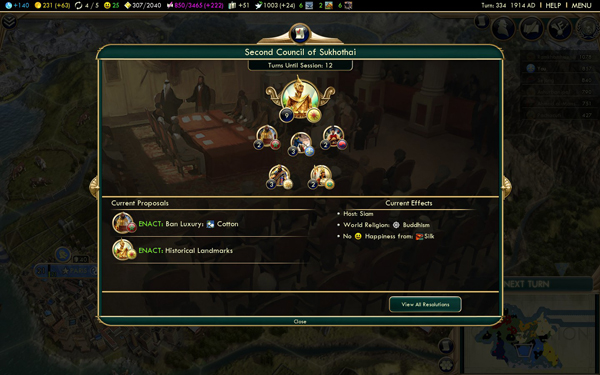
This Small Screen Can Make Or Break A Civilisation, Ignore It At Your Peril
Smaller additions such as the addition of new civilisations, scenarios and units balance out the package. It would have been easy for Firaxis to push out just the gameplay changes, but they have rebuilt the game to incorporate these changes at the ground level. Pre-existing civilisations have been changed to fit the new changes. New civilisations like Venice present this new focus with the additional challenge of being limited to one city.
Brave New World rounds out Civilization V into one cohesive whole, adding to the experience what it felt like it was missing all along. It makes the flaws of the original experience shine through and also feels like these mechanics should have been in the game from the start. This is an issue with the initial release however and shouldn’t be held against the expansion. After playing Brave New World going back to the core game is impossible, changing every part of the game for the better. It is sad however that it took nearly three years to come to this point.
Civilization V: Brave New World is an essential addition to any strategy fans collection. If you already own Civilization V it is a must, reinvigorating it from the ground up. If you are new to the series get the game with all the expansions for the full experience. If Firaxis stops here with Civilization V then this is the best way to leave it, on a high-note that changes everything that came before it for the better even if it has a few small rough spots.
+ | Provides Much Needed Cultural Overhaul | – | Highlights A.I. Diplomacy Issues |
+ | World Congress Adds New Layer To Mid-Late Game Democracy |
| |
+ | Improved Mid-Late Game Keeps Matches Engaging |
| |
+ | Rounds The Civilization V Out To Create A Wonderful Whole |
|
|
| Civilization V: Brave New World : 90% Uncovered |
